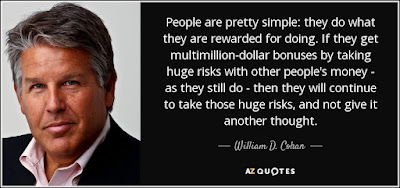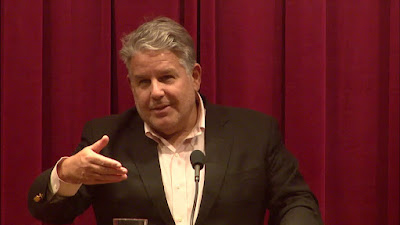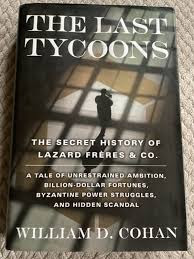Top Seven Ideas From The Book "The Last Tycoons: The Secret History of Lazard Frères & Co." A Book Written By William D. Cohan
"The Last Tycoons" is a book written by William D. Cohan. The full title of the book is "The Last Tycoons: The Secret History of Lazard Frères & Co." "The Last Tycoons" delves into the secretive world of investment banking, focusing on the history and inner workings of Lazard Frères & Co., one of the most prestigious and influential financial firms in the world. The book provides a comprehensive and captivating account of the firm's rise to prominence and its involvement in shaping the global financial landscape. Here are some of the seven main points and themes explored in "The Last Tycoons":
1. Historical Background: The book begins with an exploration of the origins of Lazard Frères & Co., tracing its history back to its founding in the 19th century. It highlights how the firm grew and evolved over time, navigating various financial crises and changes in the global economy. The story of Lazard Frères & Co. begins in the bustling streets of 19th-century New Orleans. Alexandre Lazard, one of the firm's founding members, was a shrewd entrepreneur with a vision to capitalize on the booming cotton trade. With perseverance and business acumen, he transformed a small merchant firm into an international financial powerhouse.
2. Personalities and Leadership: "The Last Tycoons" introduces readers to the key personalities who played significant roles in the firm's success. It delves into the lives and leadership styles of influential figures such as André Meyer, Felix Rohatyn, and Michel David-Weill, providing insights into their characters and how they shaped the firm's culture. André Meyer, a charismatic figure, was known for his ability to forge strong relationships with clients. His charm and financial acumen made him a sought-after advisor among corporate titans. One of his most famous deals was brokering the merger between Warner Bros. and Seven Arts, creating a major entertainment conglomerate.
3. Deal-Making and Power: The book sheds light on the secretive world of investment banking and the art of deal-making. It explores the intricate negotiations, strategies, and power dynamics involved in major financial transactions, mergers, and acquisitions. In the 1980s, Felix Rohatyn orchestrated the rescue of New York City from bankruptcy. Dubbed the "Felix the Fixer," he masterfully negotiated with various stakeholders, including government officials and creditors, to secure a bailout package that saved the city from financial collapse. His deal-making skills earned him widespread acclaim and cemented Lazard's reputation as a formidable force in the financial world.
4. Relationships with Governments: Given the firm's global influence and significant involvement in international finance, "The Last Tycoons" examines the complex relationships between Lazard and various governments around the world. It explores how the firm's connections influenced financial and political decisions. During the 1997 Asian financial crisis, Lazard played a crucial role in advising the Indonesian government on managing its economic turmoil. Michel David-Weill, then the senior partner of Lazard, leveraged the firm's international connections to help Indonesia secure a bailout package from the International Monetary Fund (IMF). This deal highlighted the immense influence investment banks like Lazard had in shaping the fate of nations.
5. Impact on Wall Street: Through its examination of Lazard Frères & Co., the book also provides broader insights into the functioning and dynamics of Wall Street. It touches upon the challenges and opportunities faced by investment banks in the ever-changing financial landscape. In the midst of the dot-com bubble, Lazard advised numerous technology startups on initial public offerings (IPOs). One notable example was when they guided a Silicon Valley-based startup that revolutionized e-commerce, transforming it into a publicly-traded company valued in the billions. The success of this IPO not only bolstered the firm's reputation but also had a profound impact on the overall sentiment in the tech sector.
6. Culture and Traditions: "The Last Tycoons" explores the unique culture and traditions of Lazard Frères & Co. that set it apart from other financial institutions. The firm's secretive nature and emphasis on discretion and trust are among the aspects discussed in the book. The culture of Lazard was built on a foundation of trust and confidentiality. When an ambitious employee accidentally leaked sensitive information about a potential merger, the firm's leadership swiftly addressed the issue and reinforced the importance of discretion. This incident showcased the strong commitment to protecting client interests and maintaining an aura of secrecy that permeated the firm.
7. Lessons and Reflections: Throughout the narrative, William Cohan offers readers lessons and reflections based on the history and experiences of Lazard Frères & Co. These insights can be valuable for individuals in the financial world and those interested in the intersection of finance and power. In the aftermath of the 2008 financial crisis, Lazard navigated the treacherous waters of regulatory changes and public scrutiny. Instead of yielding to short-term pressures, the firm focused on maintaining its core principles of integrity and prudence. This approach allowed them to emerge as one of the few investment banks that weathered the storm without significant damage to their reputation.
Overall, "The Last Tycoons: The Secret History of Lazard Frères & Co." is an in-depth and well-researched exploration of a powerful financial institution and its impact on the global economy. It offers readers an engrossing look into the world of high finance and the individuals who shaped it.
Related Posts:
3. TOP TEN LESSONS FROM THE BOOK "ZERO TO ONE" BY ENTREPRENEUR AND INVESTOR PETER THIEL
4. TOP ELEVEN LESSONS FROM THE BOOK ""THE UNDERCOVER ECONOMIST" BY TIM HARFORD
5. TOP 10 GOVERNMENT SECONDARY SCHOOLS FOR BOYS IN ENGLAND
Other Related Posts:
1. TOP 12 ESSENTIAL STEPS TO LAND A JOB IN LONDON'S THRIVING BANKING SECTOR
2. TOP TEN IDEAS FROM THE BOOK "MONEYLAND: WHY THIEVES AND CROOKS NOW RULE THE WORLD AND HOW TO TAKE IT BACK"
3. TOP TEN IDEAS FROM THE BOOK "THINK & GROW RICH" BY NAPOLEON HILL
4. THE FIRST MOVER ADVANTAGE IN ARTIFICIAL INTELLIGENCE: PAVING THE WAY FOR INNOVATION
5.TOP DISADVANTAGES OF INHERITANCE TAX IN THE UNITED KINGDOM AND IT'S IMPACT ON WEALTH CREATION







Comments
Post a Comment
Thanks for leaving comments. You are making this discussion richer and more beneficial to everyone. Do not hold back.